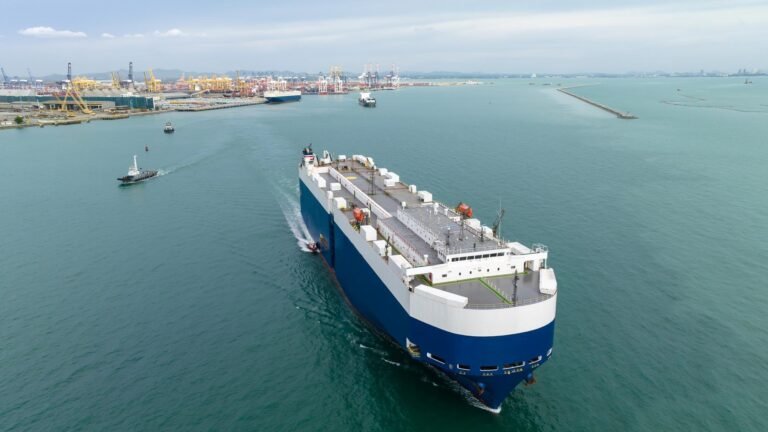The Proposed South Korea–Europe Green Shipping Corridor: A Game-Changer in Maritime Decarbonization
The proposed South Korea–Europe Green Shipping Corridor (GSC) could cut carbon emissions by over 70% along key trade routes between Pyeongtaek Port and major European automotive hubs, a new report found.
The report titled ‘Charting a Net-Zero Pathway’, published by South Korea’s nonprofit organization Solutions for Our Climate (SFOC), proposes the establishment of a green shipping corridor between Pyeongtaek Port—the largest hub for automobile imports and exports in South Korea—and major European ports (Bremerhaven, Antwerp, Zeebrugge, and Southampton), presenting strategic pathways for the decarbonization of the maritime sector.
The green corridor is positioned as a key step in the maritime sector’s green transition and a leading model for long-distance, low-emission shipping. With the International Maritime Organization’s (IMO) recent announcement of the net-zero Framework at MEPC 83, the Korea–Europe partnership offers a timely opportunity to fill the leadership vacuum in global shipping decarbonization, as per SFOC.
For South Korea—home to one of the world’s largest shipbuilding industries—the proposed corridor also marks a significant progress in its Greenship-K Program, which targets a complete phaseout of GHG emissions from shipping by 2050, in line with the IMO’s 2050 net-zero target.
The corridor zeroes in on pure car and truck carriers (PCTCs) which operate on regular, high-volume routes and require less complex cargo-handling infrastructure compared to container terminals. This makes them more adaptable for early adoption of green technologies, presenting a practical and scalable entry point for rolling out zero-emission shipping solutions.
Beyond its operational aspect, the Korea–Europe GSC presents wider implications for the global green corridor landscape. First, it broadens the scope of decarbonization by incorporating a diverse vessel class, complementing container-based initiatives and expanding industry participation. Second, by prioritizing a long-haul, transcontinental route over intra-European short-sea shipping, it enables greater absolute emissions reductions, the organization explained.
Pyeongtaek Port is Korea’s primary hub for automotive trade and a strategic location for launching green corridor initiatives. It serves as a key export point for domestic automakers including Hyundai, Kia, and KG Mobility, particularly for shipments to Northern and Central Europe.
The governance structure of Pyeongtaek Port is also said to offer ‘favorable’ conditions for green corridor development. The port is overseen by Pyeongtaek Regional Office of Oceans and Fisheries, with hinterland infrastructure largely financed by private capital. This collaborative governance scheme makes it well-suited for public-private partnerships, a key element of the proposed GSC implementation strategy, SFOC said.
To turn this potential into reality, the report recommends policy instruments such as a dedicated Green Corridor Act, fuel supply infrastructure, and expanded financial incentives to ensure implementation. These shall be augmented by the active participation of key private-sector stakeholders such as shipping companies, fuel suppliers, cargo owners, and investors.
One of the key features of the Korea–Europe GSC proposal is the adoption of green methanol, a low-carbon alternative to conventional marine fuels. Unlike gray or brown methanol, which are derived from fossil fuels and emit over 100 gCO₂e/MJ, green methanol is produced from renewable sources and generates near-zero emissions.
The report estimated that the combined eastbound and westbound operations between Bremerhaven–Pyeongtaek leg alone emit over 2 million metric tons of CO₂ annually when powered by conventional heavy fuel oil. Transitioning to green methanol could eliminate approximately 1.4 million tons of those emissions. With methanol projected to account for more than 20 percent of global marine fuel use by 2050, the report emphasized the need for a reliable and scalable supply chain.
“Amid changing global dynamics, green shipping corridors with Europe present a strategic opportunity for South Korea. With Europe leading maritime decarbonization, Korea is well-positioned to cooperate by establishing a private-sector-led pilot corridor centered around Pyeongtaek Port. In response to the IMO’s GHG reduction targets and the EU’s tightening regulations, developing green shipping corridors is essential to securing the long-term competitiveness of Korea’s shipping and shipbuilding industries.” Jueun Han, researcher from SFOC, commented.
Green shipping corridors have rapidly expanded in popularity on a global scale. South Korea sees these green maritime routes as an important step in achieving carbon neutrality in shipping.
Earlier this year, South Korea and Australia decided to establish a green shipping corridor to support international shipping’s zero-emission goals and create an environment for eco-friendly fuel supply. The duo said it would begin the process of establishing the green shipping corridor in the first half of this year, including a preliminary feasibility study.
What is more, industry leaders from North America, Asia and Europe formed the North Pacific Green Corridor Consortium (NPGCC) last year to work together to decarbonize the value chain for commodities between North America and Asia. The NPGCC committed to applying its collective expertise to develop a corridor for decarbonizing the transportation of multiple commodities, including agricultural products, metal concentrates and steelmaking coal.

